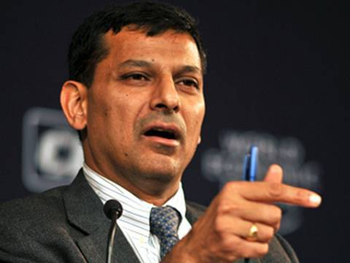Mumbai, Jun 7: RBI Governor Raghuram Rajan today kept the key policy rate unchanged citing higher upside risks to 'inflation trajectory' but said the central bank will remain accommodative provided data are supportive.

"The inflation surprise in the April reading makes the future trajectory of inflation somewhat more uncertain... rising crude prices and implementation of the seventh pay commission awards being the key risks," Rajan said in the second bimonthly monetary policy for the current fiscal.
Explaining the rationale for keeping the rates unchanged, Rajan said: "Incoming data since the April policy announcement show a sharper-than-anticipated upsurge in inflationary pressures emanating from a number of food items (beyond seasonal effects), as well as a reversal in commodity prices."
Despite citing upside risks to prices, Rajan retained the inflation target at 5 per cent with an upside bias.
He was however quick to list the Met prediction of an above normal monsoons with a reasonable spatial and temporal distribution of rainfall, coupled with various supply-side management steps and introduction of the electronic national agriculture market (e-NAM) trading portal, as factors that should help moderate unanticipated flares of food inflation.
"In addition, capacity utilisation indicators suggest that the available headroom in industry could keep output prices subdued even as demand picks up," the RBI Governor said.
Nonetheless, he said, there are upside risks to the price index trajectory such as firming international commodity prices, particularly crude oil and the 7th pay commission awards which will have to be factored into projections as soon as clarity on implementation emerges.
This is in addition to upturn in inflation expectations of households and corporate, and also the stickiness in inflation excluding food and fuel.
"Taking these factors into account, the inflation projections given in the April policy statement are retained, though with an upside bias," Rajan said, adding that considerable uncertainty surrounds these projections.
He also noted that domestic conditions for growth are improving gradually, mainly driven by consumption demand, which is expected to strengthen with a normal monsoon and the implementation of the pay commission award.
There are firm signs of recovery, which though is still uneven, he said but the central bank retained its GDP forecast at 7.6 per cent for the current fiscal year.
On private investment, which has been mission for years now, the RBI said higher public sector capital expenditure, led by roads and railways, should crowd in private investment, offsetting somewhat the subdued appetite for fresh private investment due to financial stress.
"Yet, business confidence will be restrained to an extent on account of unrelenting global factors. On a reassessment of balance of risks, the GVA growth projection for 2016-17 has been retained at 7.6 per cent with risks evenly balanced," Rajan said in the policy statement, which would probably the last policy where interest rate is anchored by RBI Governor.






Comments
Add new comment